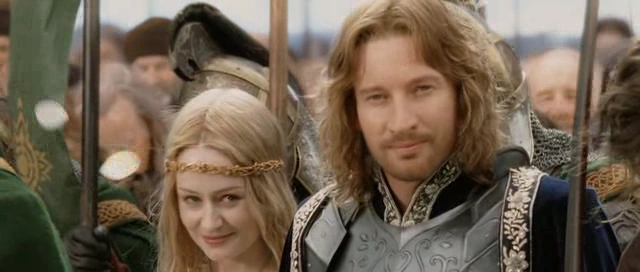The Steward and the King
by Laura West
“There are no tidings… save that the Lords have ridden to Morgul Vale; and men say that the new captain out of the North is their chief. A great lord is that, and a healer; and it is a thing passing strange to me that the healing hand should also wield the sword.” – Warden of the House of Healing
At the opening of today’s reading, not all those who have played a part in the vanquish of Sauron know the ending as we the privileged readers do. The citizens of Gondor anxiously await any hint of news about the fate of Frodo and the army that set out for the Black Gate. No one is more tormented by the watch than Éowyn, who spends her days in agony, longing to have ridden out to battle with Aragorn and his company. Éowyn, the shieldmaiden of Rohan, spurred by a desire to fight and avenge, is tortured by her captivity in the House of Healing as she recovers from her battle wounds.
But I do not desire healing,” she said. “I wish to ride to war like my brother Éomer, or better like Théoden the king, for he died and has both honour and peace.”
Can we not sympathize with her yearnings and her sorrow? When our hearts burn with a desire for justice, a desire to fight for those causes that we hold true and noble and worthy of self-sacrifice, do we not condemn those who stand in our way? Her zeal for her kin and her cause is admirable – it stirs within her loyalty and courage – and not without reward. Perhaps if she had not sought the glory of the battlefield so ardently, the final words of the Witch-King of Agmar would not have been so fatal. Recognizing this, we understand her torment and we, too, desire for her to be “uncaged.” And yet her sorrow results not only from her confinement.
Enter Faramir, the foil to her honor-loving soul. He, who encounters Éowyn in the House of Healing, is not so easily enraptured by her love of the glory of war and not afraid to be frank with her. He challenges her perception that death for a just cause is the only way to achieve glory or attain righteousness.
You desired to have the love of the Lord Aragorn. Because he was high and puissant, and you wished to have renown and glory and to be lifted far above the mean things that crawl on the earth. And as a great captain may to a young soldier he seemed to you admirable. For so he is, a lord among men, the greatest that now is. But when he gave you only understanding and pity, then you desired to have nothing, unless a brave death in battle. […] Do not scorn pity that is the gift of a gentle heart.”
For Éowyn, to be pitied is to be labeled weak. For Aragorn and for Faramir, to be pitied is to be forgiven, to be healed, and to be nurtured. Thus, the mark of the true victor is one who is both just and merciful. One who fights bravely and one who heals tenderly. Glory is not won only on the battlefield, but also in acts of restitution and forgiveness. With this conviction, the proclamation of the Warden rings ever more true. “A great lord is that and a healer; and it is a thing passing strange to me that the healing hand should also wield the sword”. True to this judgment of him, after his coronation, Aragorn pardons and makes peace with those who sided with Sauron. In another instance, he judges Beregond appropriately for abandoning his post, but commends him for his loyalty to Faramir.
But in focusing on the glory of Aragorn, let us not think that greatness is only achieved singularly. In a beautiful way, the marriage of Lord Faramir and his Lady Éowyn unites in love (that most sacred bond) the just and the merciful, the soldier and the healer. Each completes what the other lacks and by their commitment to each other, they are made whole. And so we as readers are comforted by the knowledge that while only a few are singularly great, in partnership, many can approach a similar level of renown.
